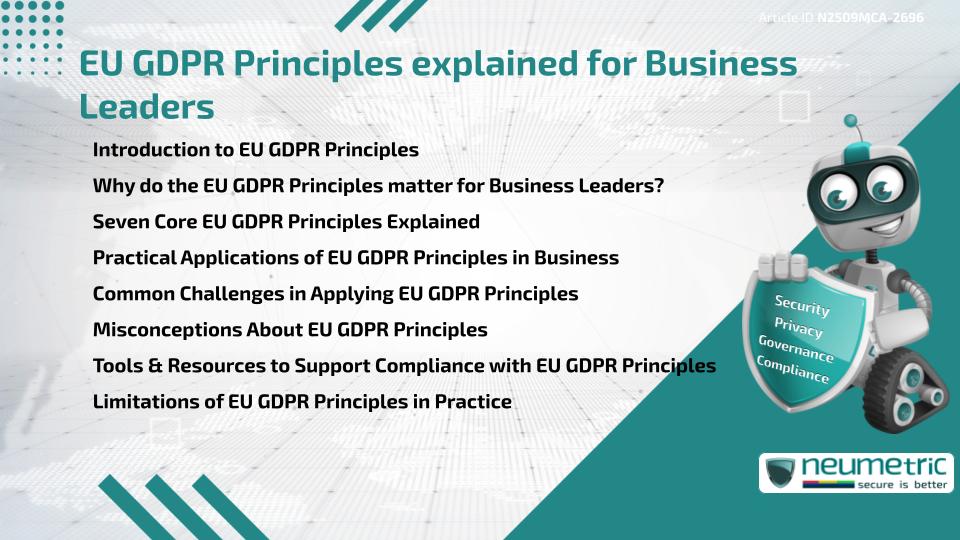Table of Contents
ToggleIntroduction to EU GDPR Principles
The EU GDPR principles form the foundation of the General Data Protection Regulation [GDPR], Europe’s landmark Privacy law. They guide how Organisations should collect, use & safeguard Personal Data. For business leaders, understanding these principles is critical not just for Legal Compliance but also for building Customer Trust & avoiding costly Penalties.
Why do the EU GDPR Principles matter for Business Leaders?
The GDPR applies to any organisation handling the Personal Data of European Union residents, regardless of location. This means even non-European businesses must comply if they serve EU Customers. The EU GDPR principles emphasise Accountability, Transparency & Fairness in handling data. By applying them, business leaders can:
- Strengthen brand reputation.
- Reduce the Risk of fines & legal disputes.
- Improve Customer confidence.
- Create stronger Governance structures.
Seven Core EU GDPR Principles Explained
The Regulation is built on seven (7) Core Principles:
- Lawfulness, Fairness & Transparency: Data must be processed legally, fairly & openly.
- Purpose limitation: Collect data only for specific, legitimate purposes.
- Data minimisation: Limit collection to what is necessary.
- Accuracy: Ensure data is correct & up to date.
- Storage limitation: Do not keep Personal Data longer than required.
- Integrity & confidentiality: Protect data with appropriate Security Measures.
- Accountability: Demonstrate Compliance with all GDPR obligations.
These Principles function like the pillars of a contract — if one collapses, the whole Framework Risks losing Credibility.
Practical Applications of EU GDPR Principles in Business
Applying the EU GDPR principles involves embedding them into daily operations. Examples include:
- Drafting clear Privacy notices for Customers.
- Regularly reviewing Retention Schedules.
- Training staff to recognise Data Breaches.
- Conducting Data Protection Impact Assessments [DPIAs] for new projects.
This is similar to workplace safety rules — Compliance is not optional but an integrated part of daily activities.
Common Challenges in Applying EU GDPR Principles
Organisations frequently struggle with:
- Complexity of data mapping: Knowing where all Personal Data resides.
- Vendor Compliance: Ensuring Third Party Partners meet GDPR standards.
- Cultural change: Shifting staff behavior to prioritise Privacy.
- Balancing business goals: Meeting commercial needs while respecting Privacy obligations.
These challenges echo the difficulties of balancing Financial discipline with innovation — both are necessary, yet often in tension.
Misconceptions About EU GDPR Principles
Some common misunderstandings include:
- GDPR applies only to large corporations (false — it applies to all Organisations).
- Consent is the only lawful basis for processing (false — there are several others).
- Compliance is a one-time project (false — it requires ongoing monitoring).
Correcting these misconceptions ensures business leaders can prioritise resources effectively.
Tools & Resources to Support Compliance with EU GDPR Principles
Several tools help streamline GDPR Compliance, including Data Inventory platforms, Breach Detection systems & Consent Management solutions. These resources reduce the burden of manual Record-keeping & improve Accountability. Selecting the right tools depends on company size, industry & Risk profile.
Limitations of EU GDPR Principles in Practice
While the EU GDPR principles provide a strong foundation, they cannot solve every data challenge. For example, the rapid adoption of Artificial Intelligence & Cross-border Data Transfers often raises new questions not fully addressed by the principles. Additionally, Organisations must interpret how each principle applies in their unique operational context.
Takeaways
- The EU GDPR principles consist of seven (7) core rules.
- Business leaders must apply these principles to protect Personal Data & build trust.
- Challenges include Vendor Compliance, Cultural change & Data Mapping.
- Misconceptions such as “consent is the only basis” hinder effective Compliance.
- GDPR Compliance requires ongoing Monitoring & Accountability.
FAQ
What are the EU GDPR principles?
They are the seven (7) core rules that govern lawful, fair & secure processing of Personal Data under the GDPR.
What is the Principle of Accountability in GDPR?
It requires Organisations to demonstrate Compliance with all GDPR obligations through Policies, Audits & Documentation.
How does the principle of Data Minimisation work?
It limits data collection to only what is necessary for the stated purpose.
Do Small Businesses need to follow EU GDPR principles?
Yes, GDPR applies to Organisations of all sizes that process EU Personal Data.
How often should Compliance be reviewed?
At least annually, but ideally as part of Continuous Monitoring & Data Governance practices.
Need help for Security, Privacy, Governance & VAPT?
Neumetric provides organisations the necessary help to achieve their Cybersecurity, Compliance, Governance, Privacy, Certifications & Pentesting needs.
Organisations & Businesses, specifically those which provide SaaS & AI Solutions in the Fintech, BFSI & other regulated sectors, usually need a Cybersecurity Partner for meeting & maintaining the ongoing Security & Privacy needs & requirements of their Enterprise Clients & Privacy conscious Customers.
SOC 2, ISO 27001, ISO 42001, NIST, HIPAA, HECVAT, EU GDPR are some of the Frameworks that are served by Fusion – a SaaS, multimodular, multitenant, centralised, automated, Cybersecurity & Compliance Management system.
Neumetric also provides Expert Services for technical security which covers VAPT for Web Applications, APIs, iOS & Android Mobile Apps, Security Testing for AWS & other Cloud Environments & Cloud Infrastructure & other similar scopes.
Reach out to us by Email or filling out the Contact Form…


